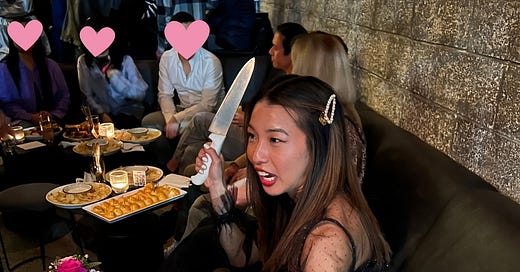I turned 32! And boy, am I glad to be 32—it’s going to be a much better year than 31. My 31st birthday was a month after I had quit my biglaw job, and I was so stressed about my future that I could only throw together a small dinner at the last second, even though the Aries in me always loves a good excuse to throw a party. (I even held a Funemployment Party the weekend after my last day, when I was still riding high on the exhilaration of quitting but before the panic set in à la Albert Brennaman in Hitch.)
This year, I’ve gotten much better at handling the uncertainty and external judgments of not toiling under the auspices of W-2 employment, so I managed to get it together enough to host a combination birthday/book deal fête!
In honor of becoming older and wiser, I wanted to talk about the Paul Hastings slide (sorry; the slide created…





